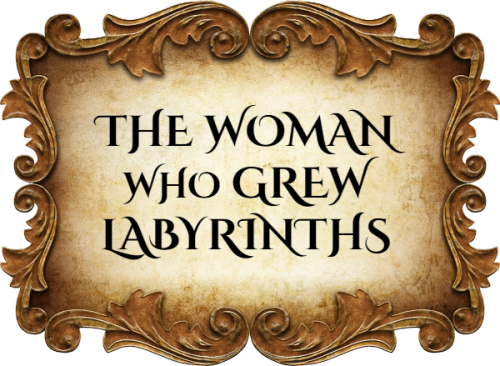-
The ogress who proposed marriage, a fairy tale for enlightenment
Sprites dance in a trail of stars along the water’s edge and beneath the bridge to pinch the toes of trolls. Stories live here, and tiny mouths pass them in twinkles. The crone has ears to hear such tales, and she knows one to tell for those who cannot bear things they have once done. Sit and listen.
Find what meaning you will.

There was a maiden in a quaint village near a bubbling brook filled with spirits, sprites, and spoons. She tried her best to be a beautiful and proper girl, suitable for a fine marriage match. But it was all a lie.
One breezy evening the villagers celebrated a bang-up summer crop with music and dancing. The maiden twirled, careful to hold out her hand prettily and step lightly. Suddenly, there were gasps and cries of fear.
An ogress interrupted the dance. She held a wildflower, aglow with tiny fairies buzzing about its nectar. Her bulbous chin quivered. She was an emotional ogress.
“I want us to be happily ever after,” the ogress said to the maiden. She buckled to one knee. “Will you be my wife?”
The maiden’s mother rushed to her daughter and wrapped a protective arm about her shoulders. “How dare you humiliate my daughter,” she spat. In a fever she shrieked: “Pitchforks! We need PITCHFORKS here!”
Villagers jeered at the ogress. Roosters clucked in panic. The wildflower’s tiny fairies opened wide their eyes.
“Wh—why do you pr-propose?” the maiden stammered, keenly aware of all eyes upon her. “You are an ogress, an unacceptable match for me. Um. Off you go?”
The ogress appeared confused. She stretched forth the wildflower. Tiny fairies buzzed the maiden’s nose.
The maiden swatted and turned her face away.
Having misplaced their pitchforks, villagers threw tomatoes on forks at the ogress. She shielded her head with an arm and hurried away. When no one was looking, the maiden ran after her to the bubbling brook of spirits, sprites, and spoons. There she found her beloved ogress waiting as usual but dripping tomato sauce.
“Forgive me,” the maiden begged, falling to her knees and taking the ogress’s enormous hand. “But why did you not follow our plan to elope? There is no other way for this to work.”
The ogress trembled. Now she knew for sure what she was: ugly—and smelly besides. (It may be you are unaware that an ogress’s eyesight is poor, and she believed the maiden swatted at her nose due to stink, for the ogress could not see the tiny fairies which buzzed at the maiden’s face.)
“You should marry someone else,” the ogress whispered to the maiden. And our ogress lumbered away.
This is how our maiden’s heart came to stop. She fell into a sleep so deep no one could wake her. The mother paid healers to come. They offered spoonsful of potion to the maiden’s lips and prodded her feet with red hot pokers from the hearth, all to no avail. “What a disappointment she was,” said her mother. “There will be no grandchildren.” And she left our maiden for dead on her bed.
The spirits, sprites, and spoons found this state of affairs to be tragic. “True love will wake her,” they promised and searched across the queendom for the ogress. After three years they found her in a valley of buttercups and told her of the maiden’s sleeping death.
The ogress dropped everything.
Villagers screamed in rage to see the ogress again. She paid them no mind and entered the cottage where the maiden lay with no beating heart. The ogress found a bowl and filled it with water. She washed the maiden’s long hair as she reminisced.
She had many stories. “Do you remember when we–?” each began. The maiden’s eyelids fluttered. The ogress spoke quiet and slow, loud and fast, depending on the story. All ended with the ogress laughing. The maiden smiled in her sleep and stirred. She woke just as the ogress began the last story they shared together.
The ogress laughed when she finished the tale of betrayal, and the maiden was astonished. (She was forever astonished at things; this is why the ogress had fallen in love with her in the first place.)
“You laugh at how I hurt you,” she exclaimed. “How can this be? Have you really forgiven me?”
“You require no forgiveness,” the ogress said with a light heart. This is how she set the maiden free. For no words of forgiveness could ever take away the maiden’s guilt and shame—only the ogress’s own freedom from the betrayal could do such a thing.
“You are grinning at me,” the maiden pointed out. Still astonished.
“I no longer believe bad things about myself,” the ogress said with a shrug. “It’s a simple thing, once you see the good sense in it.”
Our maiden’s face was sore confused. The ogress couldn’t hold it back. She began to giggle. She laughed so long and hard and true that the maiden herself began to chuckle. Soon they fell to the floor together with laughter. It is late and this is a good place to end this tale.
You should know this is a true story. The spirits, sprites, and spoons bore witness to it all. When they told this tale across the land, there was amazement. “What is this hair washing nonsense?” many a peasant and nobleman asked. “The ogress was supposed to kiss her. Why didn’t she give her a kiss?”
The spirits, sprites, and spoons gave answer in one gentle voice, which is how the best answers are given. “Even better. The ogress gave her laughter.”
“And did they marry?” the many asked. (They just didn’t get it.)
At this point the spoons rightly lost their patience, but the spirits and sprites replied. “No. Happy endings prefer to happen in unexpected ways. The ogress had married a princess while the maiden slept. But that’s another story.”
“And the maiden?”
“She lived a long life astonished by things. She freed everyone she could of regret and shame by never believing they could hurt her. To be astonished and to offer freedom is all that is required to be a crone, so you could say that is what became of her. She was halfway there from the beginning.”

-
The Skeleton Godmother with Pox, a fairy tale for enlightenment
Mice scurry in the village seeking bread and cheese. A crone with a basket drops crumbs, so soft is her heart for tiny things. And for you as well, no matter how insignificant you feel. Listen now to her tiny tale.
Find what meaning you will.

There was a ghost who was beginning to forget who she once was.
She lived in the house in which she died, looking out over the gardens of her estate from the triangle attic window. On occasion, her husband visited the attic and caught glimpses of her. This happened less often as time passed.
The day came when he could not see her at all, no matter how frantically she waved her arms during lightning storms.
A great terror assailed the ghost: Who was she now? No one! Both unseen and unheard. Not only that. There was nothing specific in all the world for her to do. She did not matter.
Who was she now? No one! This left her bereft.
One day she sat staring out her triangle attic window when she saw a skeleton picking blackberries from a bush. Lonely, she gave it a wave of her ghostly hand.
How startling it was to see the skeleton move like a flash! The ghost next heard a knock at the door. She drifted downstairs and called out in blood-curdling voice, “Come in if you will. I am a ghost and cannot open the door.”
The doorknob rattled. It turned ever so slow. Next the door opened with a creak and a glow.
There on the porch stood a skeleton with pox. The ghost recoiled, but upon closer inspection, she could see the pox spots were mere bits of blackberry stuck to its teeth and ribs. Still, it was a horrifying sight to have upon her porch.
Not wishing to be rude, the ghost warbled. “May I ask who is calling?”
The skeleton chittered its teeth. To the ghost’s wonder, she realized she understood the chitter as speech.
“I am your skeleton godmother,” the poxy skeleton said, “here to reveal your deepest wish.”
The ghost laughed.
The skeleton godmother plucked a stray briar from within its ribcage and held it aloft like a wand.
The ghost laughed.
And yet she wondered, did the skeleton speak true? After all, it did shine bright like a true godmother might. The ghost decided to give it a chance. “I already know my deepest wish,” she curdled. “I want to matter, to be seen and heard. Will you wave your briar wand and break this grief of being no more than a ghost in the world?”
Chittering with poetry most beautiful, the skeleton godmother flourished its briar wand. A great wind began to blow and twist. The house did lift in its blustery fist.
“Let it go,” the skeleton godmother chittered to finish its poetic incantation. “LET IT GO!”
I hope you understand how it is with ghosts. They are tied to the place in which they once lived. The ghost therefore had no choice. She hitched a ride upon nail and board. Caught in the twister, she came frightfully undone as she tumbled and soared.
The house was obliterated. The ghost was left with neither the features of her face, nor the shape of her body. This rendered her utterly unrecognizable in any ordinary way.
What she once was had been stripped clean.
She could not have been more stunned to discover what she really was.
Though nowhere in particular to be seen, she found herself sprinkled upon all things. And when she spoke, it was with the sounds of birdsong, wind, and rain.
And as for her husband, whom she loved so dear…
He recognized and loved this truth of her as he never had before. When he smelled a flower, it was her. When rain slipped down the shingles of his house, it was her. When wisdom hooted outside his window, it was her.
How could she have known such a grace only ever happened by letting go of what she thought she once was? Pay attention, for this may happen to you:
What the ghost most feared, turned out to be a wish come true.
Heaven on earth always surprises like this.
There is always a truer wish in your heart awaiting discovery. Be brave and know this: fear often heralds grand transformation.
Expect this transformation to take place within your awareness—a new perception of what has always and already been true.
I wonder…might you not be contained by your body, any more than the ghost turned out to be contained by hers? It does seem a bit far-fetched to believe our souls fit into our bodies, rather than the other way around. Don’t you think?
Perhaps you are seen and heard and KNOWN on a scale you don’t realize.
And never apart. Perhaps what you really are is everywhere.
Like fairy dust spread by a skeleton godmother.

-
The Woman Who Grew Labyrinths, a fairy tale for enlightenment
Grasses rustle and whisper secrets of what women will do for this world. Follow the crone as she walks in meadows, trailing words to encourage tiny creatures to come out and play. Stay close. For the crone will tell a tiny tale, meant to open our hearts and minds and make of us dragon butterflies.
Find what meaning you will.

A PEASANT WOMAN PREFERRED ROAMING MEADOWS TO DOING WHAT NEEDED TO BE DONE.
Villagers treated her as they would a leper, for she was of no use to them. But perhaps no trouble, either. For she lived in a house no one else would: Its roof was a dragon’s hide with pointed scales for shingles, and dark smoke belched from its chimney most foul.
The house often leaned as if ready to take flight, its leathery shutters flapping to catch wind. Men waited in fright to see. And there the peasant woman would come, traipsing out her front door with bare feet in sinful manner.
“No man will marry her though she weeps for children,” village women would say. “And rightly so! For what good could come of a woman who roams?” But the merchant’s wife pitied the peasant woman and knocked upon her open door. Once inside, she saw table and floor heaped with seeds.
“The wind carries them through the flapping shutters,” the peasant woman explained as she washed a teacup in haste.
“I meant to befriend you,” whispered the merchant’s wife as she backed to the door. “But this is just too weird.” And she stumbled outside to watching villagers who laughed and cheered.
Shamed, the peasant woman set about to clean, filling her pockets with seeds. She made a bowl of her skirt to gather more, and in fear of more visits dumped them out her back door. There she noticed it was a beautiful day, which as usual she could not resist.
Out she went to roam the meadow, but her pockets hung heavy with seeds. She filled her palms and threw them as she danced with the wind, for she was starting to get a little dragon in her from living in the house.
She spread her arms like wings. She swooped and spun and dropped seeds.
When the villagers awoke the next morning, they were amazed to see a labyrinth of flowers grown in the meadow. High it loomed with singing birds and sweet scent! Children clapped hands and exhausted women did smile. It became the talk of the village and soon the next and the next.
Many made pilgrimage to see the bloomed labyrinth and walk to its center. “Verily, this is balm for what ails!” they declared.
One day the birds in the labyrinth sang warning to the peasant woman: The king’s men were coming to take her away. With trepidation she peeked through the blooms of her labyrinth to see a royal carriage arrived at her house.
“The king requires you at the castle,” the driver did say and whisked her away.
At castle court the king did not speak—it was his queen. “Pray, peasant woman, will you grow a labyrinth for me? For I am filled with stones and wish to walk among blooms for magic healing.”
As luck would have it, seeds filled the peasant woman’s pockets. She got to work right away, which is to say she roamed on the next windy day. Come morning, a most beautiful labyrinth of blooms grew before the castle. The queen was pleased.
“Pray, I wish to have my own magic as do you,” the queen confessed to the peasant woman in private. “But I fear I have none. If I do, what could it be?”
The peasant woman gave question in place of an answer. “My queen, what can you not resist?”
The queen blushed red and trembled. “It is wrong for me to say, but I cannot resist peeking over the shoulders of scribes. What good can come of it?”
The peasant woman lifted her chin and spoke most sincere. “My good queen, do not resist this urge which you fear. I suggest you find papyrus and quill and do what you will!”
The king overheard. In rage and terrible spittle, he ordered the peasant woman to the dungeon. But the queen’s servants freed the peasant woman under cover of night. She was put in a carriage and pretty horses galloped her home safe. This is not the end of our story.
Years later, birds brought news that the queen lost her head for daring to scribe. And the peasant woman cried, but then she laughed. For she knew the queen had roamed in her own way, with her own magic. No one could have guessed what happened next.
Women across the land heard tell of their beloved queen’s courage and took it to heart. They roamed for themselves, and Creation dawned good and wild once again.
How does it end for our peasant woman? With countless labyrinths, long white hair, and villagers treating her as they would a beloved mother. Her life turned out to be all she could have wished. It was nothing she expected, and every love she did not resist.
Heaven on earth comes like this.





